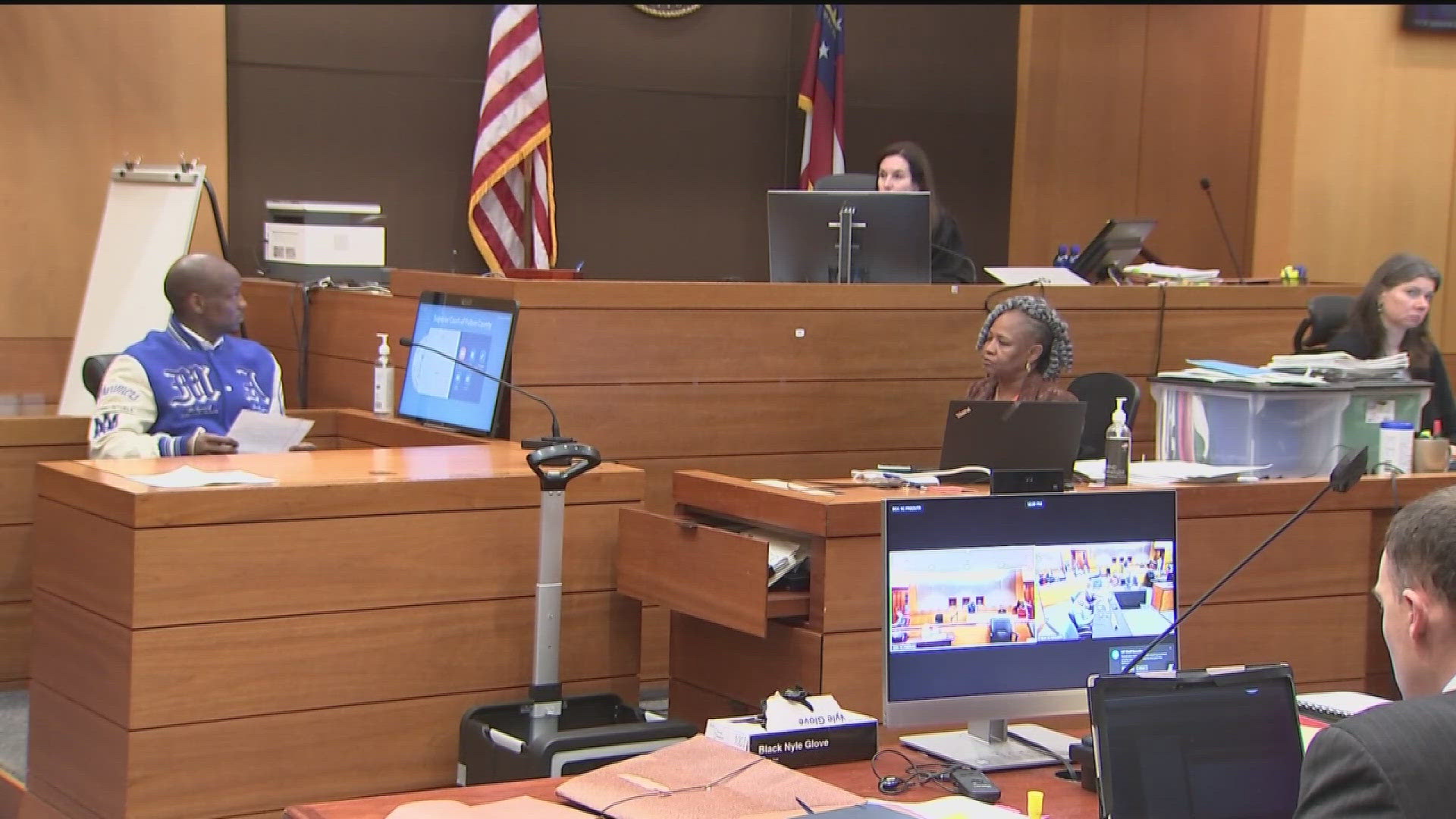FULTON COUNTY, Ga. — Jurors in the YSL RICO trial involving rapper Young Thug returned to the courtroom on Monday for the first time in nearly two months. They have a new judge and new rules -- but the same courtroom and the same reluctant witness on the stand.
Proceedings continued Tuesday with that witness, Kenneth Copeland -- better known as Lil Woody. But Copeland's testimony took a turn after lunch when he refused to continue without his lawyer, Jonathan Melnick, present.
Tuesday morning, the Georgia Supreme Court suspended Melnick for six months for conduct unrelated to the YSL trial. After Copeland decided to halt his testimony, the jury was released for the day, and proceedings were cut short.
Watch the entire proceedings below
RELATED: Here's what was said in YSL RICO trial today after jurors return after more than month of delays
During his testimony Monday, he said he constantly lied to the police in order to protect himself and his family and that jurors shouldn't believe any of his previous statements. He also told the court he blamed rapper Young Thug for crimes he said he didn't commit.
"The police kept locking me up for whatever they could," he stated. "And they keep bringing up thug name, so what I did to get them off me was 'Thug did this, Thug did that.'"
Prosecutors want his interviews with police in 2015 to help build their case, which alleges YSL is a gang led by the rapper Young Thug -- not a record label -- and is responsible for several violent crimes.
Copeland had been on the stand previously, but everything after June 12 was struck from the case record, a move by Judge Paige Reese Whitaker to keep the trial in line with when motions to remove the original judge, Ural Glanville, were filed.
The saga over Glanville's recusal sidetracked the trial from early June to this week. Judge Whitaker had to start Monday's proceedings by introducing herself to the jurors following Glanville's recusal.
She also told jurors to disregard any testimony and evidence that came after the 3 p.m. break on Wednesday, June 12, which was the last break for that day. This testimony would have included previous testimony made by Lil Woody. Whitaker asked jurors to speak up if they were unable to disregard prior testimony, and no one did, signaling that all jurors agreed to strike everything after June 12. The judge also took all notes from jurors after that date.
Lil Woody, who cannot be prosecuted for anything he says on the stand, told prosecutors that he didn't recall the answers to their questions dozens of times and begged them to leave him alone.
"You ask me about 2015? I have got my life together. Y'all trying to put this on my conscience," he said. "Y'all trying to put people's lives in my hands . . . I'm tired of y'all because y'all know y'all are wrong."
More on recent case developments
The case's initial judge, Ural Glanville, was removed after attorneys for Young Thug had argued that he should no longer oversee the case because of a June 10 proceeding known as an ex parte meeting that became the subject of deep contention in the trial.
In her order, Judge Rachel Krause -- who was assigned the recusal matter -- stated, "This Court has no doubt that Judge Glanville can and would continue presiding fairly over this matter if the recusal motions were denied, but the 'necessity of preserving the public's confidence in the judicial system' weighs in favor of excusing Judge Glanville from further handling of this case."
The controversial private meeting led to Young Thug's attorney Brian Steel being held in contempt and sentenced to a 20-day jail sentence, which was reversed after the state Supreme Court granted him bond.
Steel had been held in contempt for refusing to reveal his source for how he heard about the ex parte meeting.
Judge Glanville later released the transcript of the meeting with the witness, Kenneth Copeland, a.k.a. "Lil Woody."
Copeland was arrested on June 7 and held in contempt after refusing to testify on the stand as part of an immunity agreement. A few days later, in the judge's chambers, prosecutors shared an email sent to them by Copeland's attorney accusing them of making him a target by forcing him to testify. They also said his attorney was threatening to pull out of the case.
Prosecutors later told Copeland that if he still refused to take the stand, he could be in jail until every defendant had their cases decided. He did eventually testify.
Copeland had an attorney present for the meeting, but she was a stand-in for his usual lawyer, who was out of town. Steel insinuated that the court was committing "coercion" as no representation for his client was invited to the meeting.
The extraordinary turn in the case captivated legal observers.

